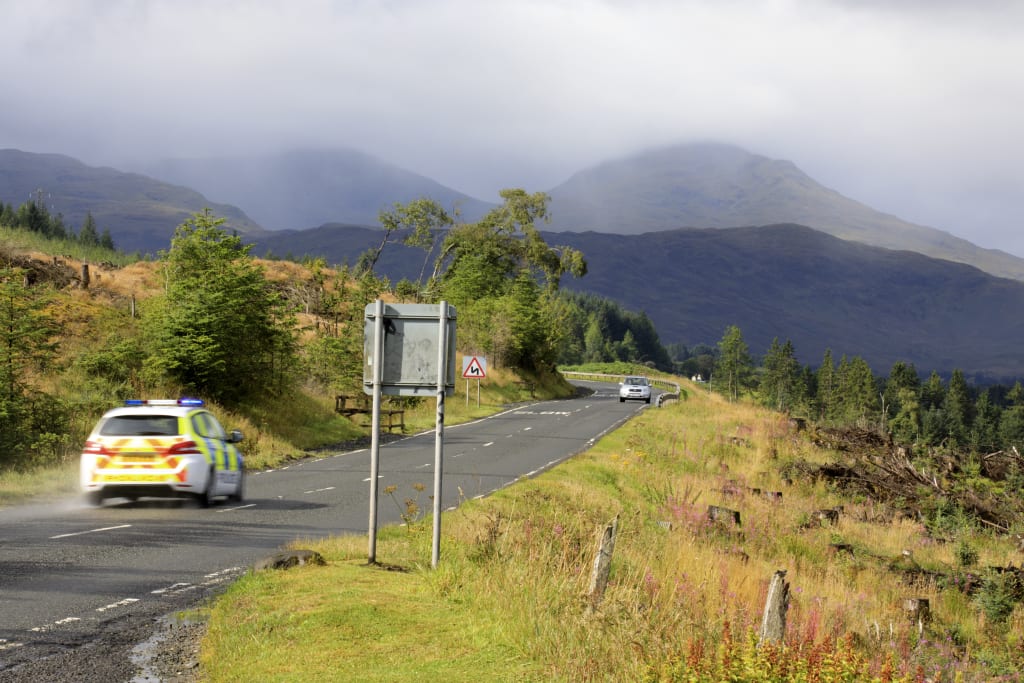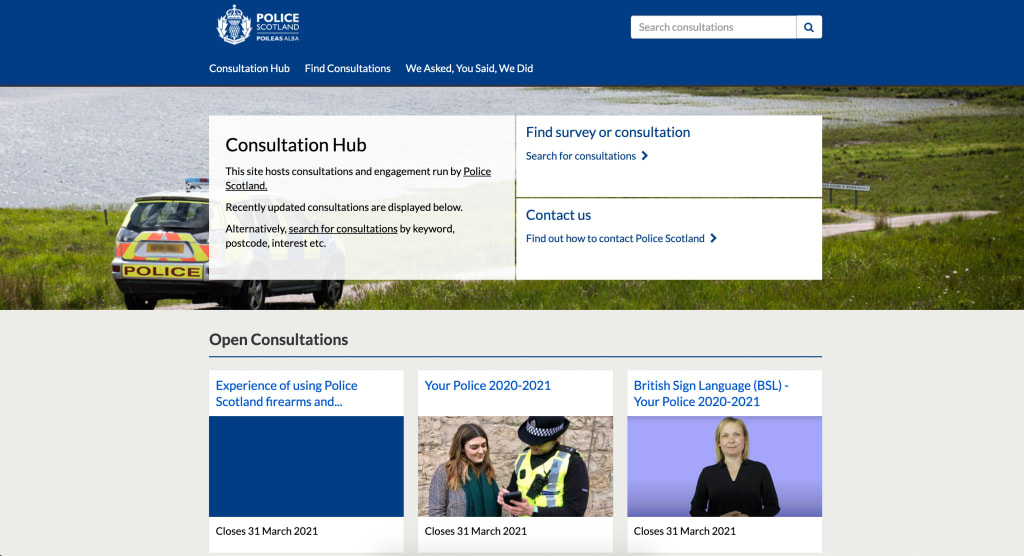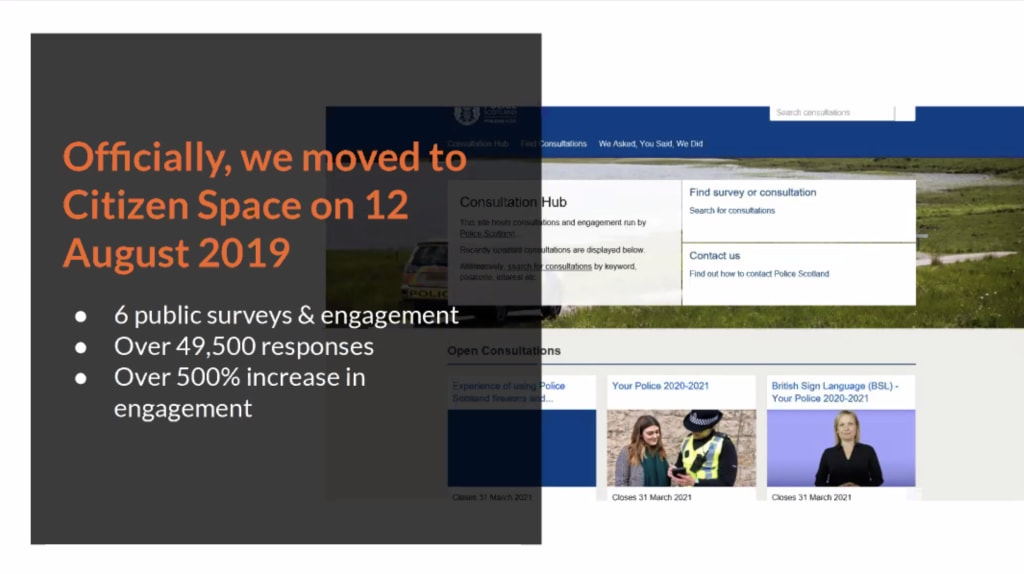How Police Scotland implemented a cultural and digital transformation with help from Citizen Space

On the surface of it, Delib sells consultation and engagement software. But that’s only one facet of our mission as a company; the ultimate goal is to change the culture around consultation and local democracy for the better. Tech is such a small part of the whole equation. Our aim is to disrupt the change-resistant, outdated and top-down attitude of so many public bodies, and encourage openness, transparency and citizen-led change. We do this by being experts in our field and providing ongoing top-quality education, expertise and training to our customers, as well as to the general public. It’s a long, ongoing process, and the work is never really finished. We call it tedious subversion.
We’ve got a lot of brilliant customers and the work they do is excellent and important. However, it’s rare that the entire organisation is on board with, or even aware of our tools and what they can do. So when I interviewed Eve Georgieva (EG) and Davina Fereday (DF) from Police Scotland, I was pleasantly surprised to get what was essentially a how-to-guide for facilitating a complete internal cultural overhaul.
Citizen Space isn’t a magic wand (but it is pretty close). Technology alone does not a digital transformation make. It takes persistence, continuous learning, and putting in the work. Here are some of the reasons why Police Scotland’s public and internal consultation work has been so successful.
They set up a (small) task force
Cultural change doesn’t happen overnight; it’s a continuous process, and without someone in place to guide and support that process it’s unlikely to happen. This is what we see a lot: a small number of people who are enthused about engaging well, but without the resources, permission or time to train an entire organisation and eliminate its reliance on legacy tools.
At the time of writing, Eve was just about to start a new role in the Scottish Government, but during her time at Police Scotland she worked with Davina in a small team that is responsible for central oversight of both public and internal consultation, as well as training and onboarding.
There were a lot of people relying on our old survey tool, but…Citizen Space was the better platform in terms of data protection issues as well as for central oversight.
DF: It’s a big undertaking to roll out a platform like Citizen Space for a large national organisation like this. You do need a dedicated team behind that to support people using it. We had an off-the-shelf survey tool before, so the first thing Eve and I set out to do was stop people using that. There were a lot of people relying on it, but as an organisation we didn’t feel it was appropriate. Citizen Space was the better platform in terms of data protection issues as well as for central oversight.
DF: My main remit is to lead public engagement and research for the organisation, to help inform our policy and practice, service changes, strategy and innovation work. I bring that all together for the organisation, so they’ve got robust insights that they can use to inform decision-making as well as being able to stand up to scrutiny.
EG: And I was the Insight and Engagement lead, so working alongside Davina. I was there for exactly two years, leading the research and engagement side of things, establishing an engagement framework for the organisation.

They built education on consultation best practice into the training process
Consulting well is so much more than just knowing how to use a tool and running statutory exercises. If it’s just seen as an extra chore that gets in the way of a department doing what they were going to do anyway it’s not worth anyone’s while. There’s an understanding within Police Scotland all the way up to the top that citizen feedback is a cornerstone of an accountable and effective public service, and that is thanks to Eve and Davina’s work educating their colleagues on best practice.
DF: We see the whole thing as a package, so Citizen Space is a tool, and in addition to that our team provide a service in terms of providing quality assurance, the survey design, checking to see if it’s the right methodology and implementing the correct framework.
EG: Yeah, that’s one thing that’s been beneficial about our team being set up around the time that Citizen Space was procured: the framework we’ve been able to set up. We train people, not just in the technicalities and functionalities of Citizen Space, but also in the principles of engagement. So getting people on to Citizen Space has provided a real education opportunity. The platform is already visually accessible, and people can access it on their mobiles, but we tell people that they also need to write content in language that people understand.
Everybody who’s used Citizen Space [within Police Scotland] loves it.
EG: I shared an example recently of a consultation that’s extremely long with difficult language, with a dropdown list that includes terms like ‘inquisitive crime’. Two years in the police, I still don’t know what inquisitive crime is and I’m not Googling it out of protest! I’m using it as an illustration of inaccessible language, and that when you design things from the inside out and write from your own perspective without thinking about who has to read it, you’re not going to get a good response. When you design things from the outside in, so people can relate to it and understand it, and it’s actually meaningful for them because they see the feedback, they engage better.
And have they faced any resistance while implementing this framework?
DF: As with any kind of change, we had a few people that were used to using the old survey tool and were a bit resistant at first – but they’ve totally come around to Citizen Space now. We had others that really wanted a more accessible platform, so that was quite an easy transition. Everybody who has used it loves it. We’ve got loads of requests coming in to switch over, so that’s testament to how popular it is.
It’s all about the people
Sometimes, with all the bureaucracy that surrounds public processes, and the deadlines and facilitation work that is involved with consultation, it’s easy to forget why it exists in the first place: to involve citizens in decisions that affect their lives. Police work is very visible and often contested, so maintaining standards of accountability is essential at all levels, but – and this applies to all public bodies – it’s more difficult to reach marginalised communities. Eve and Davina’s work aims to build bridges with the public and hard-to-reach groups in a couple of ways: by demonstrating that citizen feedback has a tangible impact, and by getting out into the community.

EG: Feeding back is really, really important. That’s how we establish our trust with people and show we’re transparent in what we’re doing. There’s nothing more demotivating than if you’re responding to a survey or engagement or consultation and you never hear back, or you just see some bland statistics like ‘X amount of people agreed with this statement’. Having that feedback there keeps it open and transparent. Respondents can see that they’ve given an opinion and because of it an action has been taken – I think that’s really powerful.
EG: So to give an example: in the Your Police survey we asked ‘what could the police do better in your area?’ and people have given us their postcodes in the beginning of the survey. So, we’ve mapped all the responses against local police divisions and different local council areas. From those we’ve produced lists of every specific place where people have said in the survey that they wanted more police presence, and those are presented on a weekly basis to local police division commanders. So, they’re making operational decisions based on what people were saying in the hope that this also increases public confidence.
It’s about policing by consent, but also proving that we’re doing that.
DF: Eve has picked up on it a couple of times – but yes, increasing that trust means being open and accountable, doing what we say we’re going to do, and being mindful of how we manage interactions, whether that’s police- or public-initiated contact. Accessibility is a key one as well. Understanding what language people use, going to them and making an effort, and working with grassroots organisations is about building trust and is part of all that good community policing that’s a traditional part of what the police have done for years and years. It’s about policing by consent, but also proving that we’re doing that. Responding to those insights and taking action off the back of them keeps people engaged and shows that we’re accountable and open to citizen feedback.
EG: Yes, we published the first feedback in the summer as we just wanted people to see that we’re acting on the insights, and that was published on the website and Citizen Space.
The results speak for themselves
The results of Eve and Davina’s work have been pretty astonishing. But it’s not just the numbers – as Eve mentioned, the results from Your Police (which is still open at the time of writing) are being acted upon while the consultation is still open as responses come in, meaning that citizen comments are having an impact in real time.
EG: The numbers have been great – it’s difficult to measure the results that we had before, but we think there has been an increase in response rate to our public consultations by about 500% since switching to Citizen Space. I looked at the responses from last year, and we had nearly 50,000 responses from six public surveys and engagements.
There has been an increase in response rate to our public consultations by about 500% since switching to Citizen Space.
DF: The current Your Police survey is up to 30,000 now.
EG: Wow. Yeah, there you go. We’ve presented on many reports and scrutiny boards, and the numbers are an illustration of the fact that we’ve put in a lot of effort to make things more inclusive, more open, more engaging, to inform people that this is a two-way conversation. We have consultations in British Sign Language or Easy Read formats, and we’ve put in more time to connect with third sector organisations and diversity and equality groups. That’s not the traditional police style – historically it’s been, ‘we just tell you these are the five top priorities and X percentage of you voted for this’, and that’s it, wrap up. But now, we’re better at asking for and taking into account qualitative feedback.
DF: The results have inspired loads of actions by the executive during COVID, and that’s creating some really interesting work in terms of reaching out to vulnerable and diverse communities, which is one of the biggest challenges for us. That’s no fault of Citizen Space, but we can’t rely on those communities finding their way to the platform.
So, Citizen Space is a gift that keeps on giving in terms of the insights that it’s creating because it’s generated all this excitement from very senior police officers. They’re really engaged with the insights now and they’re acting on them, which is fabulous to see.
EG: Yes, because of the exec buy-in, the senior leadership, those numbers have weight and people feel like, ‘oh yes, we have a responsibility with those’, which has been great.
DF: Yeah. The Chief Constable was really keen to understand what we could be doing better during COVID and he wanted to respond to that. Your Police was part of that, so the survey was designed to be responsive and flexible.
So, he was monitoring the results every Monday morning with his operations management team, and they were acting on those results. From the qualitative insights, we were able to shape our communications and engagement, inform police officer daily briefings on areas that they needed to consider when approaching people with specific circumstances or special needs regarding policing and social distancing, and lots of other good, qualitative insights.

They’re always learning
As with any sort of large-scale project like this, it’s deceptive to call it ‘transformation’, as that implies a one-time event. Jason Kitcat of Essex County Council prefers to think of it as continuous change, as it leaves room for necessary improvements and learning. The results from Your Police have already had a substantial impact on local approaches to policing, but there are also lessons to be learned in the way Police Scotland approach consultation: for example, the inclusion of British Sign Language (BSL) and easy-read formats.
DF: As a result of the feedback we had from the Your Police survey, there’s a commitment by the organisation that all our videos have to have a BSL interpreter.
Respondents can see that they’ve given an opinion and because of it an action has been taken – I think that’s really powerful.
EG: We subcontracted out to get both BSL and Easy Read versions of the survey. There’s also internal training on how to write Easy Read, and for the past year and a half we’ve been offering the option to complete surveys over the phone with a member of our team. A phone number went out in the press to give people that option for Your Police 2020. We’ve worked with local divisions on this too – asking them to include that number when they’re sending out local press releases or flyers to areas with less internet coverage. It’s all in the hope that we reach more of these communities and people with different needs, to capture their experiences.
EG: Our motto has always been that it’s not people that are hard to reach; it’s organisations that are hard to understand or hard to trust.
DF: Yes, exactly.
Before we wrap up the call, I ask them if they have anything final they’d like to add.
EG: I was going to say a shout-out to Delib.
DF: Yes, me too, Delib is very client-focused, really easy to contact, and you always take on board suggestions. I know you’ve got a priority list, but even if you can’t implement all the customer suggestions you don’t forget any of them. You don’t run consultations in the same way that we do, but getting customer feedback is engagement and the way you do that is really good practice. Practise what you preach.
It was brilliant talking with Eve and Davina, so a huge thanks to them both and Police Scotland for the fascinating insights into the way they work. Your Police 2020-2021 is open until March 2021 if you want to check out the consultation.
Citizen Space is a citizen engagement platform trusted by government around the world. Government organisations and public bodies use Citizen Space to connect with more citizens, increase engagement and improve processes.
To learn more about what Citizen Space can do for your organisation, book a free demo and we’ll walk you through it.